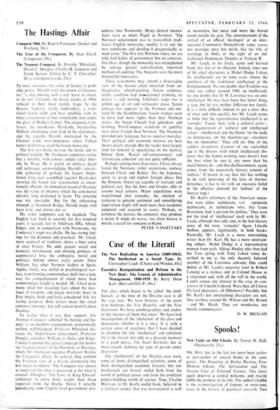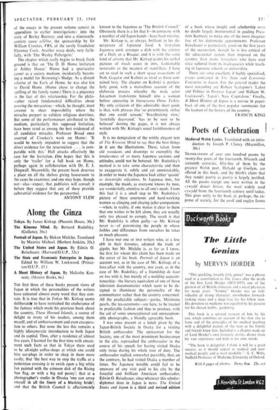Spooks!
New Light on Old Ghosts. By Trevor H. Hall. (Duckworth, 25s.)
MR. HALL has in the last ten years been author or part-author of several books in the same genre: The Haunting of Borley Rectory, Four Modern Ghosts, The Spiritualists and The Strange Case of Edmund Gurney. This latest again deserves a cordial welcome, and exactly fulfils the promise of its title. The author's hobby is the .re-investigation of famous, or notorious, cases in the history of psychical research. Two
of the essays in the present volume consist in appendices to earlier investigations: into the story of Borley Rectory; and into a nineteenth- century cause célebre, the sponsorship by Sir William Crookes, FRS, of the surely fraudulent Florence Cook. Another essay deals, very faith- fully, with 'The Wesley Poltergeist.'
The chapter which really begins to break fresh ground is that on 'The D. D. Home levitation at Ashley House.' Home had a spectacular career as a society medium, incidentally becom- ing a model for Browning's Sludge. As a distant relative of the Earls of Home, he was also kin to David Hume. (Hume chose to change the spelling of the family name.) There is a piquancy in the fact of this relationship. For the philo- sopher raised fundamental difficulties about proving the miraculous—which, he thought, must amount to sheer impossibility where the miracles purport to validate religious doctrines. But some of the performances attributed to the medium, particularly this supposed levitation, have been rated as among the best evidenced of all candidate miracles. Professor Broad once asserted of Crookes's work on Home: 'It would be merely impudent to suggest that the direct evidence for the resurrection . . . is com- parable with this.' Hall attacks effectively the case for the levitation. Ane hopes that this is only the 'trailer' for a full book on Home, perhaps again in collaboration with Dr. E. J. Dingwall. Meanwhile, the present book deserves a place on all the shelves giving- houseroom to the cases he examines; and one may hope, though not—alas—expect, that publicists will consult it before they suggest that any of these provide substantial evidence for the paranormal.
ANTONY FLEW



































 Previous page
Previous page